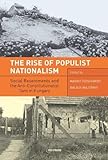The rise of populist nationalism : social resentments and the anti-constitutionalist turn in Hungary / edited by Margit Feischmidt and Balázs Majtényi.
Material type: TextPublication details: Budapest ; New York : Central European University Press, (c)2019.Description: 1 online resource (vi, 304 pages)Content type:
TextPublication details: Budapest ; New York : Central European University Press, (c)2019.Description: 1 online resource (vi, 304 pages)Content type: - text
- computer
- online resource
- 9789633863329
- 9633863325
- JN2067 .R574 2019
- COPYRIGHT NOT covered - Click this link to request copyright permission: https://lib.ciu.edu/copyright-request-form
| Item type | Current library | Collection | Call number | URL | Status | Date due | Barcode | |
|---|---|---|---|---|---|---|---|---|
 Online Book (LOGIN USING YOUR MY CIU LOGIN AND PASSWORD)
Online Book (LOGIN USING YOUR MY CIU LOGIN AND PASSWORD)
|
G. Allen Fleece Library ONLINE | Non-fiction | JN2067 (Browse shelf(Opens below)) | Link to resource | Available | on1110659657 |
Includes bibliographies and index.
Constitutional continuity disrupted / Kriszta Kovács -- Continuity, discontinuity and constitution-making : a comparative account / Zsolt Körtvélyesi -- A nation torn apart by its constitution? : nationality and ethnicity in the context of the Hungarian Fundamental Law / Nóra Chronowski -- Towards an illiberal extraterritorial political community? : Hungary's 'simplified naturalisation' and its ramifications / Chris Moreh -- Shift in the Hungarian Roma policy after 2010 / Balázs Majtényi, György Majtényi -- New forms of nationalism in and the discursive construction of the Gypsy other / Margit Feischmidt -- Civil society and the right-wing radicalization of the public sphere in Hungary / Virág Molnár -- Why elite workers' attracted by the radical right? : the impact of deeply ingrained nationalism and perceptions of exploitations / Eszter Bartha, András Tóth -- Divergent understandings of politics and motivations for civic participation among the politically active students / Andrea Szabó, Dániel Oross, Dániel Róna.
"The authors of this book approach the emergence and endurance of the populist nationalism in post-socialist Eastern Europe, with special emphasis on Hungary. They aim to understand the reasons behind the growing public discourses that seek to reframe politics in terms of nationhood and nationalism. The contributors focus on two motifs in public discourse: shift and legacy. Each offers answers to important theoretical questions endemic to Eastern Europe by combining empirical and normative social science perspectives. Some contributors focus on shifts in public law and shifts in political ethno-nationalism through the lens of constitutional law, while others explain the social and political causes of those shifts. The authors also discuss the effects of legacy in memory and culture but suggest that both shift and legacy are intertwined in producing the new era of identity politics. Overall, this volume attempts to explain how new nationalism is rooted in recent political, economic and social processes. The legal experts in the volume emphasize that the new Fundamental Law of Hungary is radically different from all previous Hungarian constitutions, and is a quasi-mirror for how the identity of the Hungarian state itself is being redefined. The book further examines the role of certain structural processes within sociology and political science in strengthening identity politics"--
COPYRIGHT NOT covered - Click this link to request copyright permission:
There are no comments on this title.
